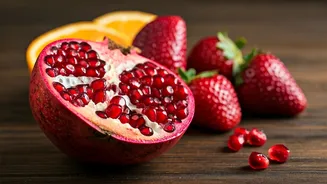Citrus Powerhouse: Oranges
Oranges are more than just a tasty treat; they're a skin-loving powerhouse, especially during the winter months. Packed with Vitamin C, oranges play a vital
role in producing collagen, a protein crucial for maintaining skin elasticity and firmness. This helps combat the dryness often associated with winter. Vitamin C is also a potent antioxidant that helps defend skin cells from damage caused by free radicals, which can accelerate aging. Including oranges in your diet, through consumption or incorporating them into your skincare routine (e.g., homemade masks), is a fantastic way to boost your glow. Eating one medium orange provides a significant amount of Vitamin C. Make the most of this winter superfood to nurture and revitalize your skin from the inside out.
Berries' Antioxidant Boost
Berries, including strawberries, blueberries, and raspberries, are bursting with antioxidants that are essential for winter skincare. These colorful fruits help protect your skin from environmental stressors like cold wind and low humidity, which can cause premature aging and dryness. The antioxidants neutralize free radicals, molecules that can damage skin cells and contribute to wrinkles and a dull complexion. Beyond their antioxidant properties, berries often contain vitamins and minerals that support overall skin health. For example, strawberries offer Vitamin C, while blueberries are rich in anthocyanins, which give them their vibrant color and have anti-inflammatory benefits. To gain these benefits, try adding berries to your breakfast, blending them into smoothies, or simply enjoying them as a snack, which will definitely assist your skin during winter.
Avocado: Healthy Fats
Avocados are a rich source of healthy fats, which are essential for maintaining skin's moisture barrier during winter. Cold, dry air can strip your skin of its natural oils, leading to dryness, flakiness, and irritation. The monounsaturated fats in avocados help to keep the skin hydrated and supple by creating a protective layer. Beyond the fats, avocados also contain Vitamin E, which acts as an antioxidant, protecting against damage from environmental elements. Eating avocado can contribute to a smoother, more radiant complexion. Incorporate avocados into your diet by adding them to salads, spreading them on toast, or using them as a base for smoothies. This is an enjoyable and delicious method to keep your skin moisturized and glowing throughout the winter season.
Pomegranate: Skin Revival
Pomegranates offer a wealth of benefits, making them an excellent choice for skin rejuvenation during winter. Packed with antioxidants and vitamins, pomegranate seeds help to combat dryness and enhance skin health. The antioxidants present in pomegranates safeguard skin cells from damage caused by environmental factors, while Vitamin C supports collagen production, essential for skin elasticity. Furthermore, pomegranate seed oil is often used in skincare products for its hydrating and anti-inflammatory properties, helping soothe dry, irritated skin. Eating the seeds or drinking pomegranate juice can provide benefits. Try adding pomegranate seeds to your salads, yogurt, or enjoy them as a snack. Pomegranates are an excellent addition to your winter skincare regimen.
Kiwi: Vitamin Rich
Kiwis are a great source of vitamins, especially Vitamin C and Vitamin E, contributing to improved skin health during winter. The substantial Vitamin C content in kiwis encourages collagen production, essential for keeping the skin firm and supple. Vitamin E is an antioxidant that helps protect against free radical damage, helping to prevent wrinkles and other signs of aging. Additionally, kiwis contain other beneficial nutrients and minerals that contribute to overall skin health and radiance. Incorporating kiwis into your diet, either as a snack, in a fruit salad, or in smoothies, will provide a boost of essential vitamins and nutrients. Eating kiwis is a flavorful and effective way to support your skin's health throughout the winter, helping it look its best.






















